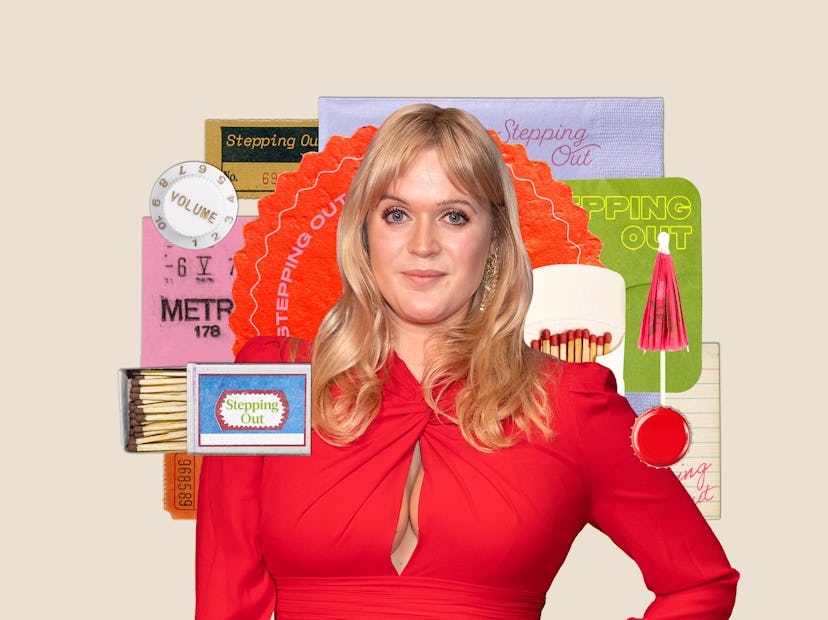Stepping Out
Dolly Alderton Gives It To You Straight
The Good Material author reveals her theories about love, friendship, and at-home martinis.

In a back booth at Balthazar, Dolly Alderton regales me with the minor disasters that befell her on her way over: First, she discovered her dress — a black, body-hugging, off-the-shoulder number — was impossible to zip up without help, and had to tap in a front desk attendant at her hotel. Then, when she went to slip into a pair of pumps in her taxi, she discovered she'd have to unzip the dress to reach her feet. “Awful. Just absolutely awful,” jokes Alderton, an author and Sunday Times advice columnist.
In person, Alderton deploys the same kind of cheeky, self-assured confessions that have made her “Dear Dolly” column a mainstay for nearly a decade, and have informed her novels — like her latest, Good Material, which came out stateside this winter and instantly hit the New York Times bestseller list. The takes come at a steady clip, as she’s ordering a vodka martini (“very cold, very dry,” she says to the waiter, before telling me how she makes them at home: with jalapeno juice in place of olive brine), discussing the state of sex scenes (”he goes down on you or f*cks you on your period, he deserves a cookie”), or reflecting on our culture’s current Irish guy obsession (“Gerard Butler in P.S. I Love You has a lot to answer for”).
Perhaps it’s Alderton’s give-it-to-you-straight-ness that’s helped her identify the most compelling catalyst in love stories today: miscommunication. “[It’s] the thing that lends itself most to frustration and an audience’s desire for the story to keep chugging along,” the 35-year-old tells me. “It’s what Normal People is about, intention not lining up with action. That's what One Day is about, [two people] who can’t seem to understand each other. [How it leads to] lost opportunity.”
Alderton, whom Lena Dunham has dubbed “the bard of modern-day love,” also sees miscommunication as a throughline of her own work. Take Good Material, which follows 35-year-old Andy, a down-on-his-luck comedian who’s dumped by his longtime girlfriend, Jen. He spends much of the book helplessly seeking to understand why she left — despite the fact that she clearly told him she just wanted to be alone. Or Ghosts (2020), in which a young woman endures the dating app-fueled misadventure of meeting someone, being led on, and watching them vanish. Even Alderton’s memoir, the U.K. National Book Award-winning Everything I Know About Love (2018), examines the ways that communication between female friends can be strained when only one is single.
“When I wrote Everything I Know About Love, the question of it was, ‘Can platonic love survive romantic love?’ My best friend had fallen in love for the first time, and I thought that was the big hurdle,” she recalls of her book, which was later adapted into a BBC One series. “It was no way near a hurdle! The baby stuff is the enormous hurdle. It’s when the chasm appears in each other's lifestyles.”
She wove this “chasm” into Good Material, and lately has been watching it play out on WhatsApp, where New York magazine’s “Why Can’t Our Friendship Survive Your Baby?” was widely shared amongst her friends this fall. “My group of eight best friends were all in a WhatsApp group, and me and two of the girls who don’t have kids had a splinter group. Then I realized, because someone was sharing screenshots or something, that the moms have a splinter group,” she says. The apps we’ve created to help us connect have only exacerbated such issues. The gap is now so wide, Alderton says, that “not having kids at 35 I think is as brave of a jump as having kids.”
After 40 minutes of marriage and baby talk — and a second round of drinks — I can’t help but confess that despite being 31 and single, I fundamentally want children one day. “Same. It's so annoying,” Alderton replies, conspiratorially.
“Not having kids at 35 I think is as brave of a jump as having kids.”
“I have checked my own fertility. It's something I recommend to women before they go down the egg-freezing route and who are feeling nervous or like their body is an enemy, which is how you're made to feel,” she says. “I know some women who have frozen their eggs, and it has been an absolute weight off their shoulders. Almost immediately it has felt like they can finally be present in their life. But I've got to be totally honest, I know a couple of other women who feel like it was an enormous physical ordeal that they weren't prepared for. They feel like they were hard-sold it in a way, [and having] eggs in the freezer is a burden.”
The desire to open up to Alderton is infectious, whether it’s about sliding into DMs, my friends’ engagements, or celebrity crushes (all of which I inevitably end up confiding in her about). Elsewhere, such oversharing might get me into trouble. But alone with the author — or cozied up with one of her novels — I’m soothed to learn that I’m not the only one with communication issues. “I still feel like the dorky girl that all the boys make fun of at the lunch table,” she concedes, prompting me to share even more of my many humiliations. Every day, we fail to see one another clearly, but no one gives voice to the disconnect quite like Alderton.